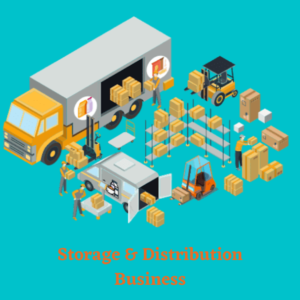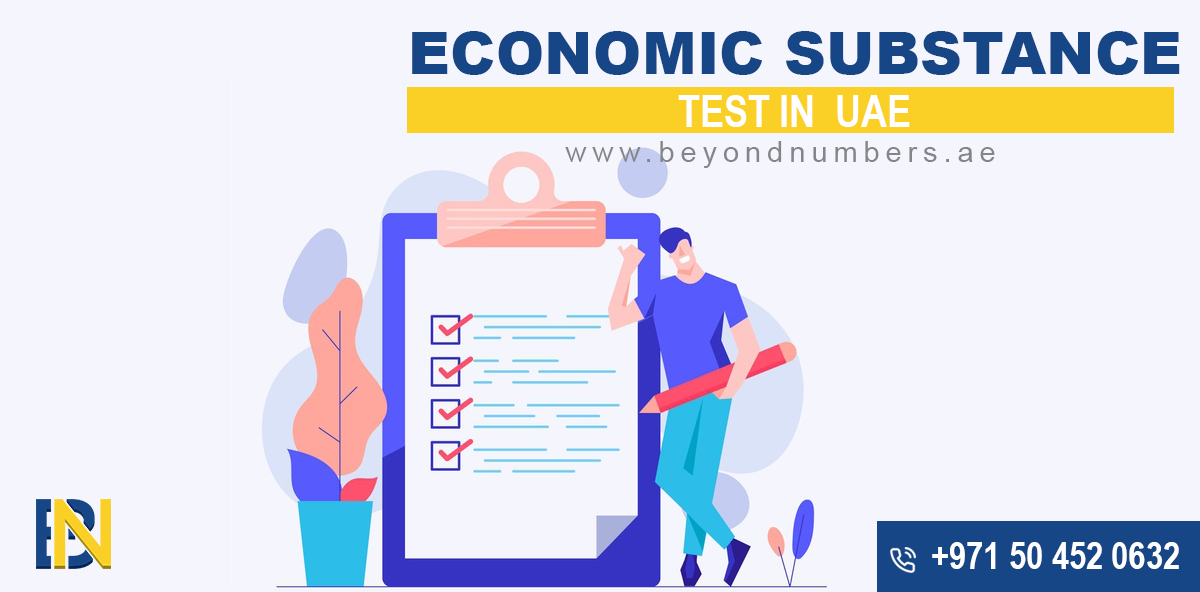Is your Company Economic Substance compliant? Did you do a Economic Substance test?
We would include a list of questionnaire that will help you to understand whether or not your Company falls under the scope of Economic Substance Regulations in the UAE.
For further assitance we at Beyond Numbers are happy to help you.
First let us understand what is Economic Substance Regulations.

Economic Substance Regulations in the UAE
Economic Substance Regulations is another compliance requirement from the UAE Government. All business entities in UAE need to notify the government whether their business category falls under Economic Substance Regulations (ESR). The European Union and Organisation for Economic Co-operation and Development (OECD) insists on having a firm ESR to avoid all forms of tax evasion on a global scale.
Applicability of Economic Substance Regulations in the UAE:
The rule came into effect from on 30th April 2019 and is applicable to all Licensee carrying on the “Relevant Activities” in the UAE, including the Free Zone or Financial Free Zone; with effect from the year 2019.
Relevant Activities under Economic Substance Regulations:
- Banking Business
- Insurance Business
- Investment Fund Management Business
- Lease-Finance Business
- Shipping Business
- Headquarters Business
- Intellectual Property Business
- Holding Company Business
- Distribution & Service Centre Business
Companies Exempted from Economic Substance Regulations
Companies in which Government of the State or Government of any Emirate of the UAE or any governmental authority or body of any of them having at least 51% direct or indirect ownership in Company’s shareholding.
To help you understand whether or not your business undertakes the relevant activities falling under ESR please answer the below questions:
Questionnaire for Economic Substance Regulation:
Banking Business
Does your business activity involve the following?
- making or giving of loans, advances, overdrafts, guarantees or similar facilities: Y/N
- making of investments: Y/N
Insurance Business
Does your business activity involve the following?
Carrying out contracts of insurance, in both the life and non-life sectors, including contracts of reinsurance and captive insurance arrangements.: Y/N
Investment Fund Management Business
Does your business activity involve the following?
Provide discretionary investment management services in relation to domestic or foreign “Investment Funds”: Y/N
Lease-Finance Business
Offer credit or financing for any kind of consideration to related or unrelated parties, and includes intra-group financing: Y/N
Headquarters Business
Do you provide services to foreign group companies, and through the provision of such services?
- Take on the responsibility for the overall success of the group; or
- Responsible for an important aspect of the overall group’s performance: Y/N
Shipping Business
Do you operate one or more ships in international traffic, for the transport of either passengers, cargo or both : Y/N
However, following are not included:
- vessels used for fishing;
- vessels that are “small” (i.e. tonnage does not exceed ten tonnes) and
- leisure vessels (e.g. cruise ships and private yachts).
Holding Company Business
Do your license activity include:
(a) HoldingCompany in accordance with the law applicable to the Licensee carrying out such activity Y/N
(b) Primary function of acquisition and holding of shares or equitable interests in other companies Y/N
(c) Does not carry on any other commercial activity : Y/N
Intellectual Property Business
Do your business holds, exploits, or receives gross income from “Intellectual Property Assets” such as copyrights, patents, trademarks, brands, and technical know-how: Y/N
Distribution and Service Centre Business:
In the course of your business do you:
- Purchase raw materials or finished products from a foreign group company, and distribute those raw materials or finished goods. Y/N
- Provide consulting, administrative or other services to a foreign group company, and those services are in connection with the foreign group company’s business outside the UAE. Y/N
Licensees that only purchase goods from or distribute goods to third parties are not considered engaged in a Distribution Business. Likewise, Licensees that are engaged in the business of providing services to third parties are not considered as carrying on a “Service Centre Business”.
If your Answer is yes to any of the above questions you need to submit a notification to the Government declaring the same. Consequently you need to file a return with the Government showing the Economic Substance of your business in Dubai.
Need Assistance please contact us. We at Beyond Numbers happy to help.
Let us now understand a little more on each of the above mentioned “Relevant Activities” and the core income generated in each business in details.
Banking Business for Economic Substance Regulation:

Licensees undertaking a Banking Business in the UAE would generally be licensed as a “Commercial Bank”, or an equivalent licensing category that allows for the acceptance of deposits, by either the Central Bank (for a Licensee established in “onshore” UAE), the Dubai Financial Services Authority (“DFSA”) (for a Licensee established in the Dubai International Financial Centre (“DIFC”)), or the Financial Services Regulatory Authority (“FSRA”) (for a Licensee established in the Abu Dhabi Global Market (“ADGM”)).
UAE businesses engaged in exchanging foreign currency and remitting money, and financial intermediaries in the sale and purchase of domestic and foreign stocks and bonds, currencies and commodities and money market transactions, are not considered a Banking Business for purposes of the Regulations.
Core Income-Generating Activities of a Banking Business:
Following should be the core Income generating activity to qualify as banking business:
- Raising funds, managing risk including credit, currency and interest risk’ – In addition to accepting deposits from the public, raising funds also includes raising capital, issuing bonds or going to the money markets.
- ‘Taking hedging positions’ – Where the Licensee mitigates risks by taking opposing or offsetting positions, the Licensee must be able to demonstrate that the related activities and decisions making take place in the UAE.
- Providing loans, credit or other financial services to customers’ – A Banking Business would be expected to lend or otherwise invest its customer deposits and other available funds. The term “customer” is not limited to individuals, but also includes corporations and other financial institutions.
- ‘Managing capital and preparing reports to investors or any government authority with functions relating to the supervision or regulation of such business’ – The banking sector is highly regulated, and involves various reporting to regulators and investors. The Licensee is expected to perform and oversee its reporting related functions and activities in the UAE.
Insurance Business for Economic Substance Regulation:
The business activity involves carrying out contracts of insurance, in both the life and non-life sectors, including contracts of reinsurance and captive insurance arrangements.
To prevent duplicate reporting, Licensees providing captive insurance services are not also considered engaged in a Distribution and Service Centre Business.
Insurance brokers, agents, and other UAE businesses providing insurance related services that do not involve assuming all or some of the insured risk do not fall within the definition of Insurance Business, although they may conduct activities that fall into another Relevant Activity category.
Core Income-Generating Activities of an Insurance Business:
Following should be the core Income generating activity to qualify as Insurance business:
- ‘Predicting and calculating risk’ : This CIGA involves the determination of the quantification and likelihood of the insured event occurring and the likely costs, and ensuring that the premiums charged are commensurate with the risks accepted.
- ‘Insuring or re-insuring against risk and providing Insurance Business services to clients’ – This CIGA includes insuring policyholders against specific risks and providing reinsurance to primary insurers.
- ‘Underwriting insurance and reinsurance’ – This CIGA refers to the evaluation and analysis of the risks of an insurance policy, and establishing the pricing for accepted insurable risks.
- ‘Taking decisions on currency or interest fluctuations and hedging positions’ – This CIGA refers to the activities required to determine if the Investment Fund is exposed to, or if it is in the best interests of the Investment Fund to enter into, hedging arrangements against currency or interest fluctuations, and taking relevant decisions regarding those
- ‘Preparing reports to investors or any government authority with functions relating to the supervision or regulation of such business’ – This CIGA does not require the Licensee to perform the administrative task of compiling the various routine annual or quarterly reports. However, the Licensee is expected to oversee this work from the UAE and to ensure the necessary systems and processes are in place, including the contractual arrangement with any third party administrator. The Licensee is also expected to have the ultimate responsibility for the reporting, and to have the necessary understanding and knowledge to accuratelyconvey the position of the Investment Fund(s) at any time.
Investment Fund Management Business for Economic Substance Regulation:
The business activity involves providing discretionary investment management services in relation to domestic or foreign “Investment Funds”.
Discretionary Investment Fund Management services include making investment, divestment and risk related decisions on behalf of an Investment Fund. UAE businesses providing fund administration, custodian, investment advisory, and other Investment Fund related services are not considered engaged in an Investment Fund Management Business.
Core Income-Generating Activities of an Investment Fund Management Business
- ‘Taking decisions on the holding and selling of investments‘ –This CIGA involves the independent consideration, deliberation and making of investment and divestment decisions. A licensee that is merely implementing decisions of another entity with respect to the holding a nd selling of investments without independent evaluation before taking steps or decisions to effect the investment or divestment decisions taken, does not perform the CIGA.
- ‘Calculating risk and reserves’ – Managing an Investment Fund involves identifying, measuring, monitoring and controlling risks attributable to the Investment Fund’s operations and investments. This CIGA refers to activities in respect of risks for the Investment Fund as a whole, as opposed to isolated risk calculations for one area of applicable risk that does not take into account all relevant risks applicable to the Investment Fund and the reserves required on a holistic basis.
Lease-Finance Business for Economic Substance Regulation:

The business activity involves providing, credit or financing for any kind of consideration to related or unrelated parties, and includes intra-group financing.
Offering credit or financing includes making loans to related or unrelated parties, entering into finance leases in relation to assets other than land, and providing credit in the form of hire purchase agreements, long term credit plans, and other types of financing arrangements.
Besides interest, consideration for the purpose of a Lease-Finance Business would also include origination and processing fees, gains upon conversion of a loan into the share capital of the debtor, and late payment penalties. However, granting of security in favour of the lender would not constitute consideration.
When there is no expectation of consideration from the credit at the time it is provided, the UAE business will not be considered as carrying on a Lease-Finance Business.
Core Income-Generating Activities of a Lease-Finance Business
- ‘Agreeing funding terms’ – This CIGA relates to the funding of the Licensee itself, and includes agreeing the type of funding (e.g. equity, preference shares, debt, etc.), the quantum of funding, the currency, the rates of interest payable, the security given (if any), and any covenants.
- Identifying and acquiring assets to be leased (in the case of leasing)
- Setting the terms and duration of any financing or leasing
- Monitoring and revising any agreements.
- Managing any risks .
Headquarters Business for Economic Substance Regulation:
The business activity involves:
- Taking on the responsibility for the overall success of the group; or
- Responsible for an important aspect of the overall group’s performance.
In order for a UAE business to be seen as having “taken on the responsibility for the overall or an important aspect of the overall group’s success or performance”, the services provided by the entity must involve:
- the provision of senior management;
- the assumption or control of material risk for activities carried out by foreign group companies; or
- substantive advice in relation to the assumption or control of such risks.
A Licensee’s position in a group’s corporate structure is not relevant for determining whether it is engaged in a Headquarters Business. The Licensee does not need to be the direct or ultimate parent of a group company for it to be considered a Headquarters Business; whether an entity carries on a Headquarters Business is entirely dependent on the nature of the services it provides to foreign group companies.
Core Income-Generating Activities of a Headquarters Business
- Taking relevant management decisions : This CIGA refers to making decisions on the substantive functions and significant risks for group companies, such as decisions on material acquisitions and purchases, the group companies’ sales and marketing strategy, product development, business process standardization, etc. For a decision to be seen as being made in the UAE, the majority of those making the decision should be physically present in the UAE.
- Incurring operating expenditures on behalf of group entities.
- Coordinating group activities.
Shipping Business for Economic Substance Regulation:
The business activity involves operation of one or more ships in international traffic, for the transport of either passengers, cargo or both.
However, following are not included:
- vessels used for fishing;
- vessels that are “small” (i.e. tonnage does not exceed ten tonnes) and
- leisure vessels (e.g. cruise ships and private yachts).
Further, the following activities will be considered a Shipping Business only where they are undertaken by a Licensee in connection with the business of operating a ship, or ships, in international traffic:
- the rental on a charter basis of ships
- the sale of tickets or similar documents
- the use, maintenance or rental of containers
- the management of the crew of ships.
The chartering of ships on a bareboat basis does not fall within the scope of a Shipping Business because the entity which charters the ship does not operate the ship. This activity may however fall within the scope of a Lease-Finance Business (depending on the terms of the bareboat charter arrangement).
Travel agencies and international shipping agencies will not be treated as carrying on a Shipping Business merely on the basis of selling tickets to passengers for international travel by ship. Entities that arrange for their own or other businesses’ goods to be transported overseas by sea are also not considered engaged in a Shipping Business, unless they themselves operate the relevant ships.
Core Income-Generating Activities of a Shipping Business
- Managing crew (including hiring, paying and overseeing crew members).
- Overhauling and maintaining ships .
- Overseeing and tracking shipping.
- Determining what goods to order and when to deliver them, organising and overseeing voyages .
Holding Company Business
The business activity involves:
(a) HoldingCompany in accordance with the law applicable to the Licensee carrying out such activity.
(b) Primary function of acquisition and holding of shares or equitable interests in other companies
(c) Does not carry on any other commercial activity.
Equity interests include shares in a company and interests in an incorporated partnership, as well as any other instrument which gives the Licensee a beneficial ownership interest in a company.
A Licensee whose activities are limited to being engaged in a Holding Company Business would only be required to meet the reduced economic substance requirements under Article 6.4 of the Regulations.
A UAE business that does not meet the narrow definition of a Holding Company Business because it either:
(i) carries on another activity; and/or
(ii) owns other forms of investments or assets (e.g. interest-bearing loans)
may be required to meet the (full or increased) economic substance requirements under Article 6.2 of the Regulations if the other activity or asset brings the UAE business within the scope of a different Relevant Activity category (e.g. Lease-Finance), and the Licensee derives gross income from such other Relevant Activity.
Core Income-Generating Activities of a Holding Company Business
The CIGAs of a Holding Company Business are all activities related to acquiring and holding shares or equitable interests in other companies, provided that such activities do not constitute another Relevant Activity, in which case, the CIGAs shall be those related to that other Relevant Activity.
Intellectual Property Business for Economic Substance Regulation:
The business activity involves holding, exploiting, or receiving gross income from “Intellectual Property Assets” such as copyrights, patents, trademarks, brands, and technical know-how.
An Intellectual Property Asset is defined as any intellectual property right in intangible assets, such as copyrights, patents, trademarks, brands, and technical know-how, from which the Licensee earns separately identifiable income in the form of royalties, license fees, franchise fees, capital gains and any other income from the sale or exploitation of the Intellectual Property Asset.
Core Income-Generating Activities of an Intellectual Property Business :
- Patents and similar assets: This CIGA includes ‘Research and development’ of new products.
- Marketing intangibles : It includes Branding, marketing and distribution.
High Risk IP Licensee
Where a Licensee is carrying on an Intellectual Property Business, it will also have to consider if it is a High Risk IP Licensee. A High Risk IP Licensee is defined under Article 1 of the Economic Substance Regulations as a Licensee which carries on an Intellectual Property Business, and under condition (a) of the definition meets all of the following three requirements:
- The Licensee did not create the Intellectual Property Asset which it holds for the purpose of its business, and
- The Licensee acquired the IP Asset from either;
- A group company, or
- In consideration for funding research and development by another person situated in foreign jurisdiction, and
- The Licensee licenses or has sold the IP Asset to one or more group companies, or otherwise earns separately identifiable gross income (e.g. royalties, licence fees) from a foreign group company in respect of the use or exploitation of the IP asset.
Distribution and Service Centre Business for Economic Substance Regulation:

The business activity involves
- Purchasing raw materials or finished products from a foreign group company, and distribute those raw materials or finished good
- Providing consulting, administrative or other services to a foreign group company, and those services are in connection with the foreign group company’s business outside the UAE.
Licensees that only purchase goods from or distribute goods to third parties are not considered engaged in a Distribution Business. Likewise, Licensees that are engaged in the business of providing services to third parties are not considered as carrying on a “Service Centre Business”.
An entity that undertakes a transaction that falls within the scope of a “Distribution and Service Centre Business” would not be required to demonstrate economic substance in the UAE if it can evidence that the transaction was not in the ordinary course of its business (e.g. a one-off transaction) and the transaction is recharged to the relevant foreign group company at cost or less.
Core Income Generating Activities of a Distribution and Service Centre Business
The CIGA in relation to “Distribution Business”:
- Transporting and storing goods, components and materials or goods ready for sale.
- Managing inventories.
- Taking orders
The following CIGAs generally apply in relation to a “Service Centre Business”:
- Providing consulting or other administrative services-This CIGA covers the provision of any type of service to the Licensee’s foreign group companies.
Need Assistance please contact us. We at Beyond Numbers happy to help.

